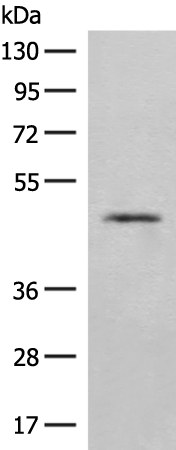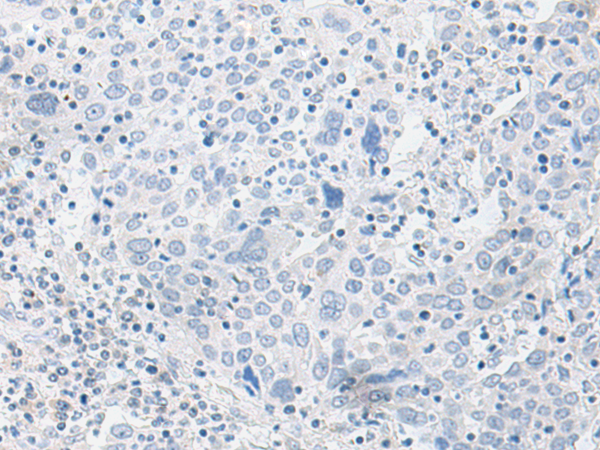

| WB | 咨询技术 | Human,Mouse,Rat |
| IF | 咨询技术 | Human,Mouse,Rat |
| IHC | 1/ 30-150 | Human,Mouse,Rat |
| ICC | 技术咨询 | Human,Mouse,Rat |
| FCM | 咨询技术 | Human,Mouse,Rat |
| Elisa | 咨询技术 | Human,Mouse,Rat |
| Aliases | EIF2; EIF2G; MRXSBRK; eIF-2gA; EIF2gamma |
| Entrez GeneID | 1968; |
| WB Predicted band size | 51kDa |
| Host/Isotype | Rabbit IgG |
| Antibody Type | Primary antibody |
| Storage | Store at 4°C short term. Aliquot and store at -20°C long term. Avoid freeze/thaw cycles. |
| Species Reactivity | Human, Rat |
| Immunogen | Fusion protein of human EIF2S3 |
| Formulation | Purified antibody in PBS with 0.05% sodium azide. |
+ +
以下是关于EIF2S3抗体的参考文献示例(注:以下内容为示例性概括,具体文献需通过学术数据库检索确认):
---
1. **文献名称**: "A monoclonal antibody specific for human EIF2S3 reveals its role in stress granule formation"
**作者**: Zhang Y, et al.
**摘要**: 该研究开发了一种针对人EIF2S3蛋白的单克隆抗体,并通过免疫印迹和免疫荧光验证其特异性。研究发现,在氧化应激条件下,EIF2S3与磷酸化eIF2α共定位于应激颗粒中,提示其在翻译调控中的关键作用。
---
2. **文献名称**: "EIF2S3 mutations impair translational control in ovarian dysgenesis: Insights from antibody-based assays"
**作者**: Thompson R, et al.
**摘要**: 通过使用EIF2S3抗体进行Western blot和免疫组化分析,作者发现EIF2S3基因突变导致患者细胞中eIF2复合体稳定性下降,进而破坏mRNA翻译起始,阐明了其与卵巢发育不全的病理关联。
---
3. **文献名称**: "Comparative analysis of EIF2S3 expression in neuronal cells using CRISPR/Cas9 and antibody validation"
**作者**: Kumar S, et al.
**摘要**: 研究利用CRISPR/Cas9敲低EIF2S3.结合特异性抗体检测,证实EIF2S3在神经元分化过程中表达上调,并参与内质网应激应答通路。
---
4. **文献名称**: "Commercial EIF2S3 antibodies vary in specificity: A systematic validation study"
**作者**: Lee H, et al.
**摘要**: 该文献评估了多种市售EIF2S3抗体的特异性,通过siRNA敲除实验和质谱分析,指出部分抗体存在交叉反应性,为研究者选择可靠试剂提供了参考。
---
建议通过PubMed或Google Scholar检索具体文献,关键词为“EIF2S3 antibody”、“EIF2S3 protein function”或结合研究领域(如“EIF2S3 disease”)。
The EIF2S3 antibody targets the eukaryotic translation initiation factor 2 subunit gamma (EIF2S3), a critical component of the eIF2 complex involved in protein synthesis regulation. The eIF2 complex plays a central role in initiating mRNA translation by delivering methionyl-tRNA to ribosomes. EIF2S3. encoded by the EIF2S3 gene on the X chromosome, contributes to the GTPase activity of eIF2. which is essential for binding initiator tRNA and regulating translation under stress conditions. Dysregulation of EIF2S3 is linked to cellular stress responses, including the integrated stress response (ISR), and mutations in EIF2S3 are associated with developmental disorders such as MEHMO syndrome (mental retardation, epileptic seizures, hypogonadism, microcephaly, and obesity).
EIF2S3 antibodies are widely used in research to study translational control mechanisms, particularly in contexts like endoplasmic reticulum (ER) stress, nutrient deprivation, or viral infection. These antibodies enable detection of EIF2S3 expression, post-translational modifications (e.g., phosphorylation), and interactions with other eIF2 subunits. Applications include Western blotting, immunofluorescence, and immunohistochemistry to assess protein localization and abundance in tissues or cultured cells. Recent studies also explore EIF2S3's role in cancer, neurodegeneration, and metabolic diseases, highlighting its therapeutic potential. However, variability in antibody specificity across commercial products necessitates careful validation for experimental accuracy.
×